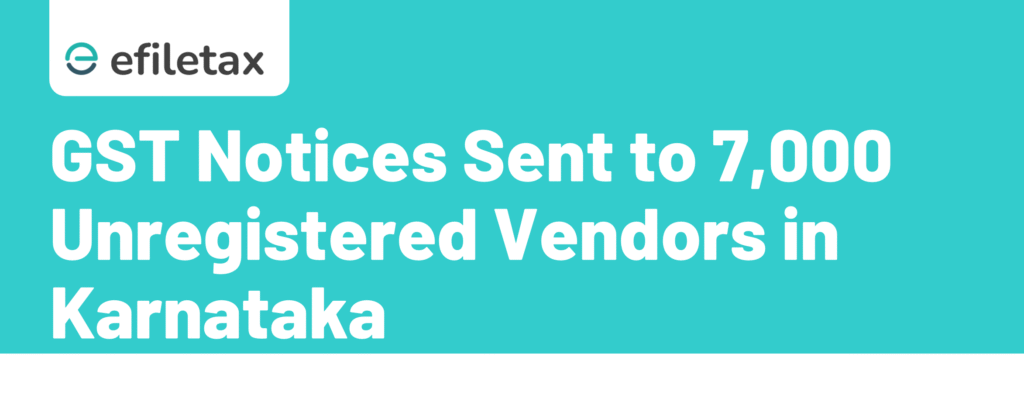
Why GST Notices Are Being Sent to Unregistered Vendors in Karnataka
Over 7,000 businesses across Karnataka have received GST notices from the state tax department. The reason? They’re operating without GST registration, despite clearly crossing the threshold limit. This crackdown is part of a larger compliance drive to plug revenue leakages and bring informal players under the tax net.
Focus keyphrase: GST notices to unregistered vendors
What Triggers a GST Notice to Unregistered Vendors?
The Karnataka Commercial Tax Department uses a combination of data points to detect non-compliant businesses:
- Turnover mismatch from income tax filings
- Banking data and UPI transaction volume
- E-commerce and delivery platform records
- GSTR-1 of registered buyers showing purchases from unregistered sellers
- TDS/TCS under GST without corresponding registration
If any of these datasets indicate taxable turnover above the registration threshold (₹20 lakh for services, ₹40 lakh for goods), a GST notice is sent under Section 63 of CGST Act or Section 25 (registration requirement).
What These GST Notices Typically Contain
| Component | What It Means |
|---|---|
| SCN (Show Cause Notice) | You are asked to justify why you didn’t register and pay GST. |
| Period of default | Specific financial years in which turnover exceeded limits. |
| Tax liability estimation | Provisional tax calculation based on third-party data. |
| Penalty and interest | Penalty up to 100% of tax due under Section 122(1) + interest u/s 50. |
| Response time | Usually 7–15 days to respond or apply for registration. |
Legal Basis of Action: Explained
The power to issue assessment orders to unregistered persons flows from Section 63 of the CGST Act. If a business is liable to pay tax but has not registered, the department can issue a best judgment assessment.
In such cases:
- Officers can estimate tax liability based on available information.
- Penalty provisions under Section 122(1)(xi) kick in for failure to register.
- If the person still fails to respond, Section 62(2) allows for demand confirmation.
Recent Case Law:
M/s. Shree Bholenath Enterprises vs. State of Gujarat (2023) – Gujarat HC upheld the issuance of notice to an unregistered firm dealing via UPI despite no formal business registration.
What Should You Do If You’ve Received This Notice?
Here’s a simple action plan:
- Don’t ignore it. Notices under Section 63 or 122 can lead to recovery action.
- Evaluate your turnover. Check if you exceeded the GST threshold in any FY.
- Apply for registration immediately, if eligible.
- Respond with explanation using Form GST REG-01 or reply on GST portal.
- Seek professional help for drafting response and computing past liability.
- Opt for GST Amnesty Scheme (if applicable) to reduce penalty and interest.
Expert View: Proactive Compliance Can Save You Trouble
“Many small vendors believe they’re too small for GST. But once UPI, Paytm, or delivery app payments are factored in, they cross the limit without realising. One delivery tie-up can expose your full earnings to the department.”
— GST Consultant, Bengaluru
FAQ: GST Notices to Unregistered Vendors
Q1. What is the turnover limit for mandatory GST registration?
A: ₹40 lakh for goods; ₹20 lakh for services. Lower limits apply in some special category states.
Q2. Can I apply for GST registration after receiving notice?
A: Yes. It is advisable to apply immediately and disclose all prior turnover to avoid penalties.
Q3. What if I ignore the GST notice?
A: Ignoring it may lead to ex parte assessment, recovery action, and blocking of bank accounts.
Final Words
The drive to issue GST notices to unregistered vendors in Karnataka is not just a warning — it’s a shift towards strict tech-driven enforcement. Whether you’re a local trader, a service provider on UPI, or a seller on Amazon, registration and compliance are now non-negotiable.
Need help with GST registration or replying to a notice?
Contact Efiletax for expert assistance today.
Snippet
Over 7,000 vendors in Karnataka received GST notices for not registering despite crossing turnover limits. Notices cite UPI, e-commerce data, and IT returns. Learn what triggered the crackdown, legal consequences, and how to respond. Get expert help via Efiletax.